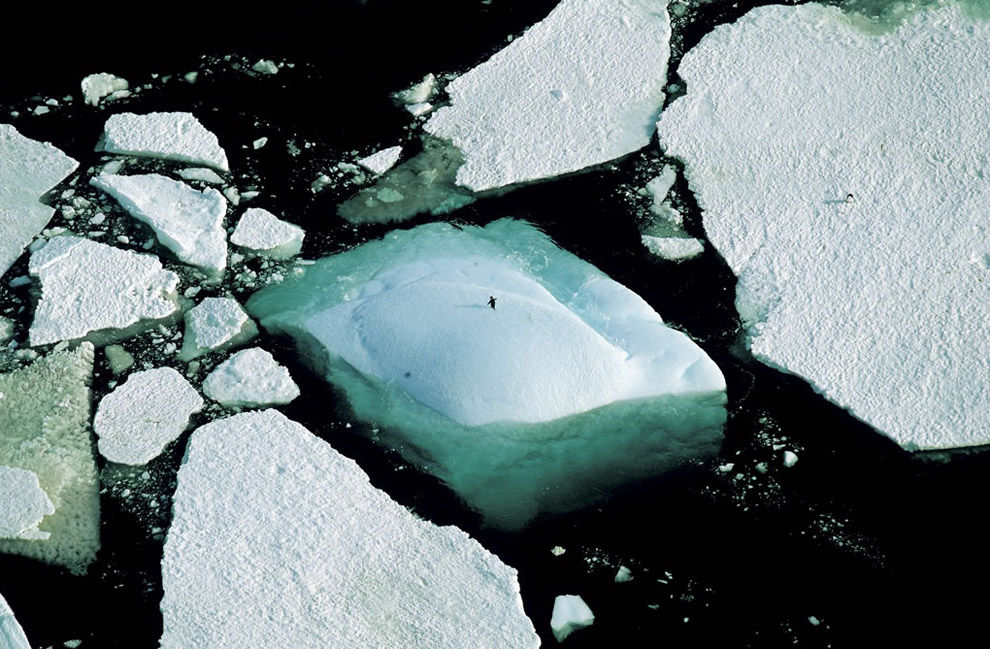A broadcast by the BBC of the Choir of Christ College, Cambridge, celebrating Christmas during the blackout of 1939.
Sunday, December 21, 2008
There is something about fire
HT: Paul Kedrosky.
A giant mechanical spider, part of a piece of free theater by French company La Machine entitled "Les Mecaniques Servants", walks along the waterfront in Liverpool, England.
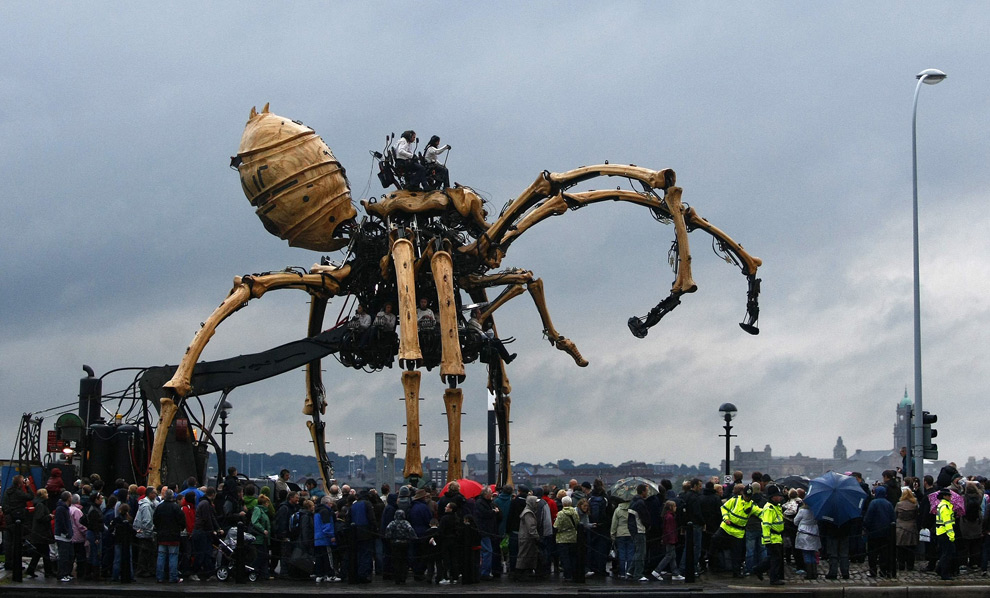
A bull sarcophagus in which a member of the Ubud royal family was cremated burns during the funeral ceremony in Ubud, Bali, Indonesia
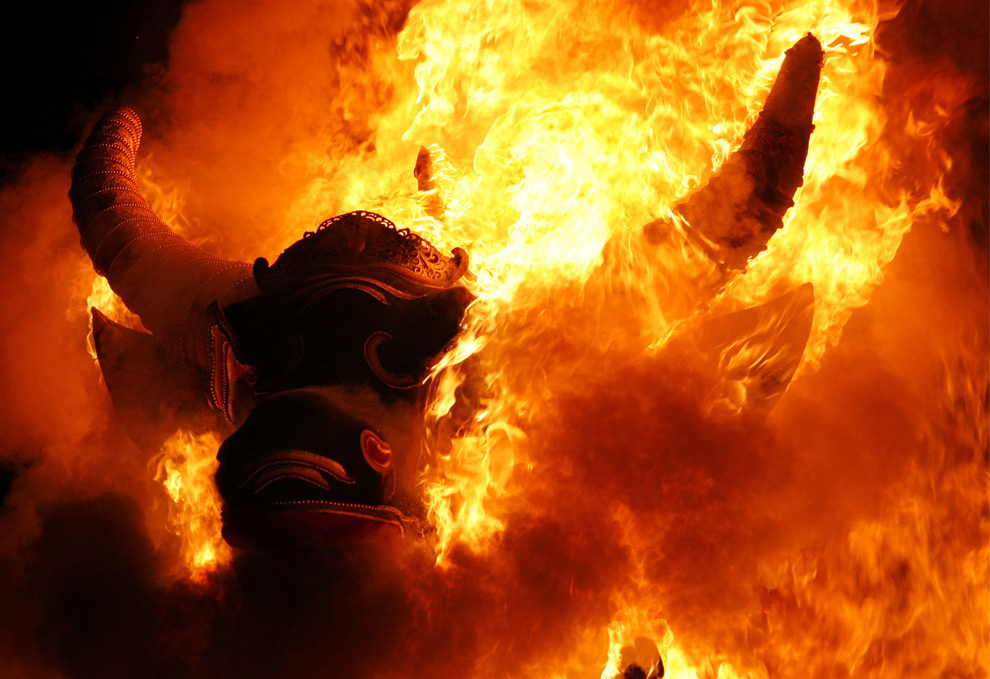
A man in a traditional "Perchten" costume performs during an Austrian league soccer match in Ried, Austria

The Guizer Jarl is silhouetted as members of his Viking Squad walk around a long boat with burning torches during the annual Up Helly Aa Festival
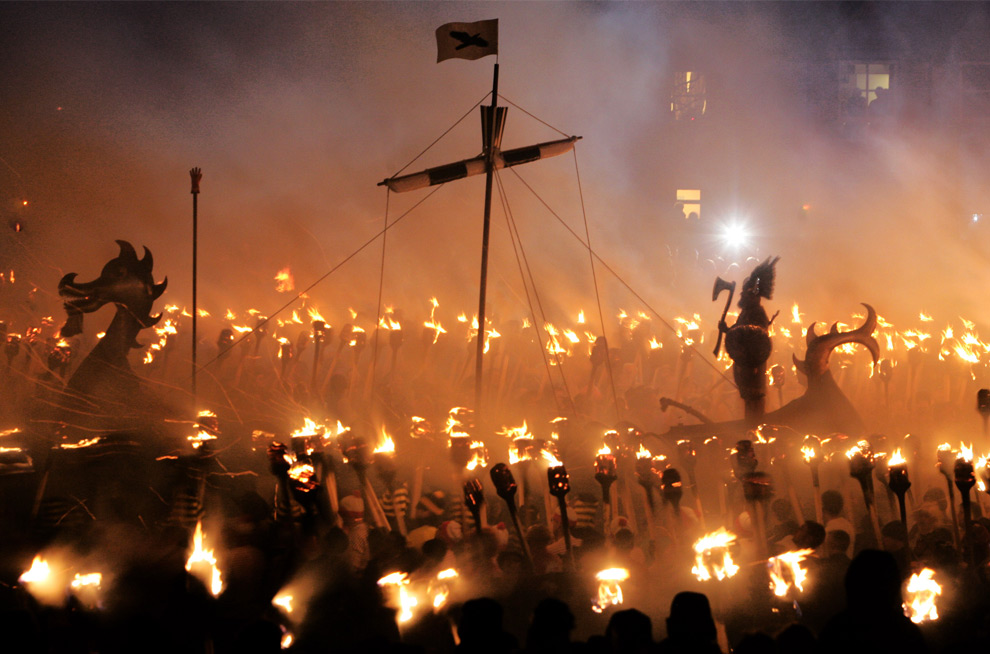
Lightning bolts appear above and around the Chaiten volcano, as it began its first eruption in thousands of years
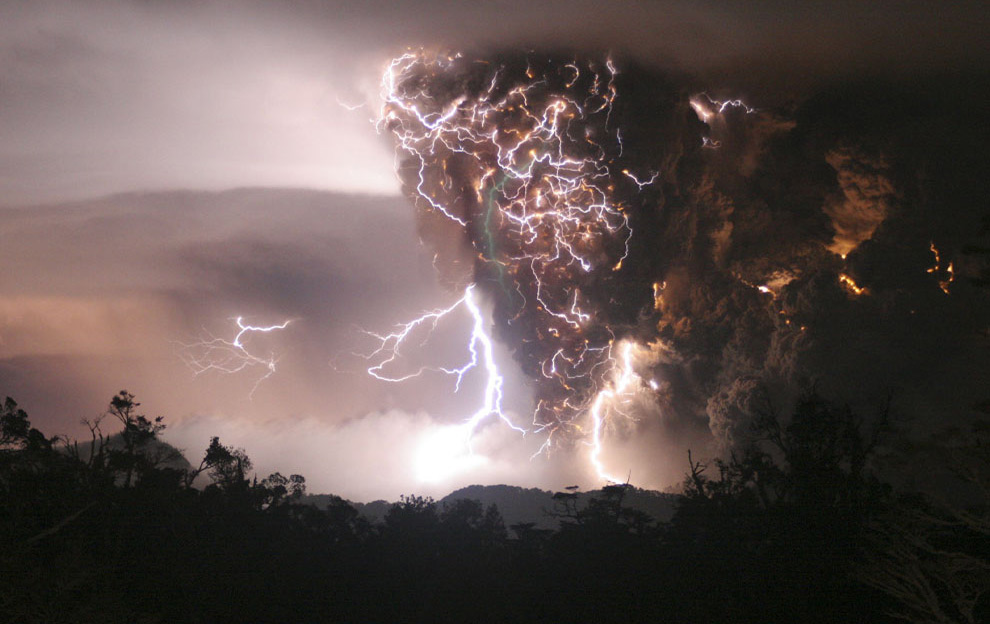
The moon and stars light up Mount Everest, also known as Qomolangma, as seen from near Everest Base Camp in the Tibet Autonomous Region

Images of books on shelves are seen projected on the walls of the Tower of David in Jerusalem's Old City

Sunday, December 07, 2008
Monday, December 01, 2008
Thursday, November 27, 2008
Mumbai
After great pain, a formal feeling comes
The Nerves sit ceremonious, like Tombs
The stiff Heart questions was it He, that bore,
And Yesterday, or Centuries before?
The Feet, mechanical, go round
Of Ground, or Air, or Ought
A Wooden way
Regardless grown,
A Quartz contentment, like a stone
This is the Hour of Lead
Remembered, if outlived,
As Freezing persons recollect the Snow
First-Chill-then Stupor-then the letting go
Monday, November 24, 2008
Phrase of the day
I want to die like my father, quietly, in his sleep—not screaming and terrified like his passengers- Bob Monkhouse
A neat step
A MAVERICK Thai general who has threatened to bomb anti-government protesters and drop snakes on them from helicopters has been reassigned as an aerobics teacher, the Bangkok Post said on Friday.HT: Paul Kedrosky
Tom Peters
On whether management is getting harder
On the whole, Peters thinks not. We exaggerate the extent of change, he feels. It is the arrogance of modernity to believe that we face unique and unprecedented challenges. What people say now about the internet they used to say about the railways, the telegraph, the radioOn his book
It was not hard science. But what in management is? “It’s mostly luck, for God’s sakes!” Peters says. He feels the same way about this mega blockbuster that made his name: “A decent book with perfect timing” is his verdict. “There’s not an ounce of false humility in that.”On his success
“Look,” Peters confesses, “I was born in 1942, in the US. I was protestant. I had relatively intelligent parents and I was white – that’s the first 99.9 per cent of it. Hard work may have done the rest.”On his neighbour's success
“I had a neighbour who won a Nobel prize for his work on kidneys – he carried out the first effective transplant. I once asked him how he’d done it. ‘We did the most operations,’ he told me. At any point in time there are 10 people up there – one of them does the most.”Malcolm Gladwell says says something similar about excellence in craftwork in his new book
Anything that is cognitively complex seems like it requires at least 10,000 hours… It’s deliberate practice, so it’s focused, determined, in environments where there’s feedback, where there’s a chance to really learn from mistakes. What’s fascinating about this notion that expertise arises only after 10,000 hours of deliberate practice is that it seems to apply incredibly broadly to an astonishing array of different professions - from playing chess to writing classical music to being a brain surgeon to playing hockey…HT: Stefan Stern
Sunday, November 23, 2008
Returning
We learned new expressions: “He is on tour” (Means: He is traveling. Doesn’t mean: He has joined U2.); “What is your native place?” (Means: Where did your ancestors live? Doesn’t mean: What hospital delivered you?); “Two minutes” (Means: An hour. Doesn’t mean: Two minutes.)

Saturday, November 22, 2008
Sunday, November 16, 2008
Analogy
Chicago builds itself up, knocks itself down again, scrapes away the rubble, and starts over. European cities destroyed in the war were painstakingly restored. Chicago does not restore; it makes something wildly different. To count on stability here is madness. A Parisian can always see the Paris that was, as it has been for centuries. A Venetian, as long as Venice is not swallowed up in mud, has before him the things his ancestors saw. But a Chicagoan as he wanders about the city feels like a man who has lost many teeth. His tongue explores the gaps - let us see now: Here the Fifty-fifth street car turned into Harper avenue at the end of the trolley line; then the conductor hurried through the car, reversing the cane seats.- Saul Bellow from "Chicago: the city that was, the city that is"
Thursday, November 13, 2008
Lawyers and Economists
Except for a depressingly small minority among them, lawyers know nothing. They are incapable of logic. They don't know the difference between necessary and sufficient conditions or between type I and type II errors. Indeed, any concept of probability is alien to them. They don't understand the concepts of opportunity cost and trade off. They cannot distinguish between normative and positive statements. They are so focused on winning an argument through technicalities, that they no longer would recognise the truth if it bit them in the butt. If you are very lucky, a lawyer will give you nothing but the truth. You will never get the truth, let alone the whole truth. Things have degenerated to the point that lawyers and the legal profession not only routinely undermine justice, but even the law.It reminded me of this old post by Brad De Long
we had found that it was possible to make intellectual and policy progress in discussions with economists because we had all been trained to think analytically: to break the issue down into background assumptions about the world, beliefs about the principal causal mechanisms, and claims about the likely effects of different policies on those chains of cause-and-effect. When we disagreed--as we often did--we could quickly ascertain where and why, and then agree on how to go hunting for pieces of information that would help resolve the disagreement. This was in striking contrast with our collective experience with lawyers or media types, who would be vague about cause and effect, or shift premises in the middle of a meeting when they saw that making different background claims about the world would provide a smoother road to their desired conclusion.
Monday, November 10, 2008
Sunday, November 09, 2008
Tuesday, November 04, 2008
Otto
Once we saw him juggling the hermit crabs in his tank, another time he threw stones against the glass damaging it. And from time to time he completely re-arranges his tank to make it suit his own taste better - much to the distress of his fellow tank inhabitantsHT: Geekpress
A new dawn of American leadership is at hand

HT: Greg MankiwThis is one of the most extraordinary people ever, but I just wish the people of the United States would accept that what is truly extraordinary is their country, and that no politician is going to get them where they wish to go. I hope they are not disappointed in Obama- too many people are treating this like the Second Coming.
Camelot Redux
Writing in the FT, Clive James puts it well
Great presidents inspire but they also deliver. The plain fact is, Mr Obama cannot deliver what he has promised. The problems he will confront are too difficult. The parallel with Tony Blair is impossible for a Briton to ignore. Enthusiasm among Mr Obama’s supporters is not just naive, it borders on the deranged, much like the enthusiasm in Britain in 1997 for Mr Blair. Remember how everything was possible, finally? “Things can only get better.” Look how that worked outPostscript: It was even better when they spoke to a man in Kenya who hoped Obama would win because his village does not have water, power, or decent roads. He used exactly the same phrase the other woman used: "Obama will make a difference"
Monday, November 03, 2008
Napoleon complex
One key reason why the presidents of large corporations do not, as some radical critics believe, control the US is that they do not even succeed controlling their own corporations.
Today's miscellany
Work is about a daily search for meaning as well as daily bread, for recognition as well as cash, for astonishment rather than torpor, in short for a sort of life, rather than a Monday-to-Friday sort of dyingThe Economist's Free Exchange Blog on the American elections.
You'll have to excuse us if we're a little edgy today. It's kind of like Christmas Eve, if Christmas only came once every four years, and if sometimes instead of presents you received a beating.
And a nice cartoon from Greg Mankiw

Sunday, November 02, 2008
The mother of all demos
On December 9, 1968, Douglas C. Engelbart and the group of 17 researchers working with him in the Augmentation Research Center at Stanford Research Institute in Menlo Park, CA, presented a 90-minute live public demonstration of the online system, NLS, they had been working on since 1962. The public presentation was a session in the Fall Joint Computer Conference held at the Convention Center in San Francisco, and it was attended by about 1,000 computer professionals. This was the public debut of the computer mouse. But the mouse was only one of many innovations demonstrated that day, including hypertext, object addressing and dynamic file linking, as well as shared-screen collaboration involving two persons at different sites communicating over a network with audio and video interface
Saturday, November 01, 2008
Thursday, October 30, 2008
Tuesday, October 28, 2008
One week to go!
If any of my economist friends who are working for Obama wants to defend his positions on ethanol subsidies, tariffs on Chinese goods, the Byrd amendment, etc., shoot me an email, and I will gladly post it for my blog readers. But I am not holding my breath.This is particularly disturbing in light of this report in Sciencedaily which indicates that, horror of horrors, politicians actually vote as they promise they will:
Candidates’ words generally match their deeds, according to Sulkin. The issues candidates say are priorities in their commercials are likely ones they care about and will take action on through the introduction and co-sponsoring of legislation, she said.and
Whether they are vague or specific on an issue doesn’t matter, Sulkin found.
When a candidate attacks an opponent on a given issue, however, it does not mean the attacking candidate cares about that issue or will act on it, Sulkin’s research shows. “Negative appeals, appeals that attack the opponent, don’t have much signaling power about what that candidate is going to do,” she said.I would still hope that Obama wins the election, simply because American politicians tend to have less power in economic matters than they do in matters of war and peace. Under normal circumstances, therefore, it is better to have an economic xenophobe in office, rather than a trigger-happy militarist.
On the other hand, these are hardly normal times. There is great demand for radical action (more Sarbanes-Oxley?), the legislature does tend to give newly-elected Presidents more freedom of action, the Democrats already control both chambers of the Congress, and, thanks to their support of that man in the White House, the Republicans are deservedly on the run. The normal checks and balances which keep Presidents from doing too much harm are mostly absent. Jeepers!
Monday, October 27, 2008
Sunday, October 26, 2008
Ted Briggs
TO DIE in a hospital bed was not the end Ted Briggs expected. He thought he had copped it when, at 16 and on Atlantic patrols on HMS Hood in 1939, he looked up to see a black object “as big as a London bus” tumble gently out of the sky and pepper the deck with shrapnel.
Saturday, October 25, 2008
Division of labour
How do you isolate a quantum bit from a noisy environment to protect the delicate quantum information, while at the same time allowing it to interact with the outside world so that it can be manipulated and measured?And
Crucially, the information stored in the nucleus had a lifetime of about 1 and 3/4 seconds, ex-ceeding a recently calculated target for quantum computing in silicon beyond which known error correction techniques could then protect the data for an arbitrarily long period of time.
Friday, October 24, 2008
More Keynes
The right remedy for the trade cycle is not be found in abolishing booms and thus keeping us permanently in a semi-slump; but in abolishing slumps and thus keeping us permanently in a quasi-boom
Wednesday, October 22, 2008
People respond to Incentives
the brain drain actually caused Fiji to become better educated.Postscript: Thanks to Gaddeswarup for the correction.
Real pain
For the first time the company is seeing a paycheck-related spike in purchases of baby formula, suggesting some real teetering out there.The FT on Keynes
On the contrary, he argued, the economic expansion should be seen as the normal state of affairs and the downturn was an “extraordinary imbecility”HT: Paul Kedrosky
What are Financial Institutions for?
Any claim that a financial innovation has achieved a concrete, positive end is a sure sign of disaster, or (in the unfortunate lingo of economics) a distortion. The purpose of a financial system is to solve a collective optimization problem whose solution we cannot guess a priori. If we are very sure that welfare is maximized by vastly expanding the housing stock and making homeowners of people who otherwise might not buy, then the government should just tax to build McMansions, and auction off the oversupply. More generally, one cannot judge a financial system by any particular outcome, because all financial systems make mistakes, and the mistakes always look good while they last. We judge financial systems by the performance of the economies they guide over time.From this post by Arnold Kling, which also has a nice explanation of the role of equity in promoting truth-telling.
This
I suspect that the main reason we have bad financial institutions is that individuals are irrational. I can well imagine that it is easier to market a Ponzi scheme (suitably dressed up) than an incentive-compatible financial contract. People think they are smarter than they really are. As a result, bad financial institutions satisfy customer demand, just as politicians offering free lunches satisfy voter demand.is interesting in light of this
They found, for instance, that "individuals who scored in the 12th percentile believed that their general reasoning abilities fell at the 68th percentile". Curiously, even the top students "tended to overestimate" the incompetent ones. But at least they were better at assessing themselves.
Wednesday, October 15, 2008
Tim Gowers
Monday, October 13, 2008
Politics is not about policy
Yet another reason why a Nerd will never be President
Krugman wins Nobel
As before, the best writeups are on Marginal Revolution.
Alex Tabarrok:
Consider the simplest model (based on Krugman 1979). In this model there are two countries. In each country, consumers have a preference for variety but there is a tradeoff between variety and cost, consumers want variety but since there are economies of scale - a firm's unit costs fall as it produces more - more variety means higher prices. Preferences for variety push in the direction of more variety, economies of scale push in the direction of less. So suppose that without trade country 1 produces varieties A,B,C and country two produces varieties X,Y,Z. In every other respect the countries are identical so there are no traditional comparative advantage reasons for trade.And
Nevertheless, if trade is possible it is welfare enhancing. With trade the scale of production can increase which reduces costs and prices. Notice, however, that something interesting happens. The number of world varieties will decrease even as the number of varieties available to each consumer increases. That is, with trade production will concentrate in say A,B,X,Y so each consumer has increased choice even as world variety declines.
Krugman (1991) (JSTOR and here) brings increasing returns together with capital and labor migration and transport costs into one model. Krugman's (1991) model has become a workhorse of economic geography and international trade. The model is too complex to explain here but the reasons for that complexity are clear to see - when everything becomes "endogenous" small initial differences can make for big effects. To minimize transport costs, for example, firms want to locate near consumers but consumers want to locate near work! Thus, there are multiple equilibria and at a tipping point the location decisions of a single firm or consumer can snowball into big effects. So Krugman has been a leader in introducing tipping points, network effects and thus the importance of history into international trade as well as into economics more generally.It is pleasant to see how economists and bloggers, regardless of political preferences, seem to applaud this choice: Mankiw, Brian Caplan, Will Wilkinson, Steve Levitt.
Sunday, October 12, 2008
Markets are the cure
How would you fancy a week’s unpaid holiday next year? Answers range, I guess, from: “I’d rather not, as I’ve mortgage to pay and it’s a bit of a squeeze” to “good. I need to recharge my batteries and tidy up the garden.” Net, it’s no big deal.Postscript:
And yet this is what recession means on average; one week’s unpaid holiday a year is equivalent to a 2.2 per cent fall in national income.
The prospect of a fall in GDP of this magnitude is a bad thing only because the pain of recession is concentrated in a few people; recessions see 4% of people lose half their income, not 100% lose 2%.
But minority losses are in principle an insurable event.

Paul Kedrosky on the state of the economy in Pakistan, where they solved the problem of falling share prices by forbidding prices from falling.
It looks more than a little reminiscent of a dying patient hooked up to an EKG. After a few palpitations, the Karachi market has now flat-lined. It has fallen to the 9100 floor -- okay 9182 -- and now sits there, in the uncomfortable the way non-viable markets do. Volumes have collapsed, going from a healthy 186-million shares a day to a comatose million shares a day, a 99.4% decline. It is simply no longer a viable exchange, with companies unable to raise money and investors unable to get liquidity or -- heaven forfend -- buy shares. Nothing. Traders are reduced to sleeping and playing video games.And
The Karachi Stock Exchange and the Karachi SEC are meeting this weekend to decide whether or not to simply close the exchange for good. At the same time, the "badla" rate, a sort of interest rate at which investors can borrow money, soared to 100% on Friday, making the record-high Libor look positively like a giveaway.
Saturday, October 11, 2008
Friday, October 10, 2008
Nobel prize
The Nobel Prize in chemistry was awarded this week to three scientists working in the United States with a jellyfish protein that glows in the dark. But the scientist who found the gene for that protein, and gave it to the eventual Nobel winners, is no longer working in the field. He now drives a shuttle bus for an auto dealership.HT: Chance and Necessity
Thursday, October 09, 2008
Wise words on the credit crisis
However it feels on Wall Street and Canary Wharf, this is not the worst economic crisis since the Great Depression. Today’s problems are not only created by financial markets but largely confined to them. Compared with the wreckage of Europe’s physical infrastructure in the 1940s, or the threats to living standards and social order from oil shortages and accelerating inflation in the 1970s, these perturbations are minor. The greatest threat to the non-financial sector is the effect on business and consumer confidence that comes from apocalyptic headlinesThe FT's management blog
Do not spend a moment of your time talking about the financial crisis unless it directly affects youPostscript: Steve Levitt links to an Op-Ed by Casey Mulligan
Tuesday, October 07, 2008
Monday, October 06, 2008
Sunday, October 05, 2008
How do we grow?
Of course, quoted firms invest millions of pounds worth of management time in looking for growth opportunities. But much of this is wasted. As Alex Coad shows, firm growth is “largely a random process.” Nothing much predicts which firms will expand and which won’t - not profits, size, productivity nor even innovation.Chris Dillow
Words of hope
If the estimated 360,000 square miles (less than 1 percent of the world’s land surface) covered by urban rooftops and pavement were a white or light color, enough sunlight would be reflected back into space to delay climate change by about 11 years, the study shows.FuturePundit
Monday, September 29, 2008
Tuesday, September 23, 2008
Monday, September 22, 2008
No comment
Night light in neighborhoods populated primarily by embattled Sunni residents declined dramatically just before the February 2007 surge and never returned, suggesting that ethnic cleansing by rival Shiites may have been largely responsible for the decrease in violence for which the U.S. military has claimed creditAnd
The effectiveness of the February 2007 deployment of 30,000 additional U.S. troops has been a subject of debate. In a report to Congress in September of that year, Gen. David Petraeus claimed "the military objectives of the surge are, in large measure, being met." However, a report the same month by an independent military commission headed by retired U.S. Gen. James Jones attributed the decrease in violence to areas being overrun by either Shiites or Sunnis.Looks like Iraq's problems are getting worse
The mote and the beam

On the one hand, I am quite sure that the "typical" Indian would not be able to tell locate the fourth, fifth, or eighth most-populous countries in the world.
They should be able to locate the first, sixth, and seventh most-populous contries, since they are our neighbours, but I am not so sure they could locate this, or even this one.
Besides, the map below
is what a map of the states would look like if each state were a country with the same sized economyand may also help explain why Americans have this trouble.
HT: Russ Roberts

Here is Gulzar on how to handle encumbrances on Government lands.
Thursday, September 18, 2008
Here come the cavalry!
Greg Mankiw reports that both the Republicans and Democrats are after Ben Bernanke.
"Why does one person have the right to grant $85 billion in a bailout without the scrutiny and transparency the American people deserve," asked House Speaker Nancy Pelosi (D., Calif) a reference to the loan the Fed gave AIG with the Treasury's blessing.I wonder what else she thinks he could have done. Maybe he could have invited her to make a speech. Or they could repeal the law of supply and demand and make US markets more like Pakistan's
Will WIlkinson on the legitimacy of technocrats in a democracy.
The credit crunch
“Today the actions of American policy makers illustrate the need for economic patriotism,” said Bernard Carayon, a lawmaker of President Nicolas Sarkozy’s center-right governing party, UMP. “I congratulate them."I don't know if this has been badly translated, but the phrase "economic patriotism" is loathsome in its harumphing smugness.
On the other hand, Chris Dillow has an article in the Times, showing that the left can produce thoughtful economic analysis
What we're seeing, then, is the cost of separating ownership and control. In private firms, or partnerships - even limited liability ones - the two are closely aligned. In stock market-quoted firms, they are not.Carayon belongs to a right-of-centre party, and Dillow is a Marxist. Who says Marxists don't appreciate the virtues of markets and private ownership?
The one Investment Bank which still looks good (so far) is Goldman, and Wikipedia(!) tells us that they
decided to offer only a small portion of the company to the public, with some 48% still held by the partnership pool.[7] 22% of the company is held by non-partner employees, and 18% is held by retired Goldman partners and two longtime investors, Sumitomo Bank Ltd. and Hawaii's Kamehameha Activities Assn (the investing arm of Kamehameha Schools). This leaves approximately 12% of the company as being held by the public.
Four more years of George Bush
Well...quote, "on their own"...we have to - we cannot have the taxpayers bail out AIG or anybody else...this is something we're gonna have to work through -- there's too much corruption, there's too much access, we can fix it, I believe in America - we can have a 9/11 commission such as we had after 9/11, 'cause this is a huge crisis and we can come up with fixes and we can make sure that every American has a safer future and that is to make them know that their bank deposits are safe and insured.Marginal Revolution
Wednesday, September 17, 2008
Roll the dice
We randomly assigned subjects to either feel relatively poor or relatively rich by having them complete demographic questions that included an item on annual income. The group made to feel poor was asked to provide its income on a scale that began at "less than $100,000" and went up from there, ensuring that most respondents would be in the lowest income tier. The group made to feel subjectively wealthier was asked to report income on a scale that began with "less than $10,000" and increased in $10,000 increments, leading most respondents to be in a middle tier. The group made to feel poor purchased twice as many lottery tickets (an average of 1.27) than those made to feel relatively wealthier (0.67 tickets, on average).HT: Free Exchange
In the second experiment, we indirectly reminded participants that, while different income groups face unequal prospects when it comes to education, employment and housing, everyone has an equal chance to win the lottery. This reminder that the lottery is a kind of “social equalizer” also increased lottery tickets purchases. The group given this reminder purchased 1.31 tickets, on average, as compared with 0.54 for those not given such a reminder.
The slave of the passions
TOWARDS the end of his 27 years in jail, Nelson Mandela began to yearn for a hotplate. He was being well fed by this point, not least because he was the world’s most famous political prisoner. But his jailers gave him too much food for lunch and not enough for supper. He had taken to saving some of his mid-day meal until the evening, by which time it was cold, and he wanted something to heat it up.and
The problem was that the officer in charge of Pollsmoor prison’s maximum-security “C” wing was prickly, insecure, uncomfortable talking in English and virtually allergic to black political prisoners. To get around him, Mr Mandela started reading about rugby, a sport he had never liked but which his jailer, like most Afrikaner men, adored. Then, when they met in a corridor, Mr Mandela immediately launched into a detailed discussion, in Afrikaans, about prop forwards, scrum halves and recent games. His jailer was so charmed that before he knew it he was barking at an underling to “go and get Mandela a hotplate!”
Elections are all very well, but the moment when black South Africans started cheering for a mostly-white rugby team, when white fans in the stadium tried gamely to sing a Zulu miners’ anthem and when Mr Mandela donned the green jersey of the Springboks—“It was the moment I realised that there really was a chance this country could work,” gushes a teary-eyed rugby official.Chris Dillow asked why a Nerd could never become president. I think this is one half of the answer.
The world is all that is the case. That last line was so pretentious. Anyway, the point stands.
Stir things up!
First, the bit which confirms what you would expect (emphasis added)
Alesina and his coauthor show that geographic segmentation of ethnic groups is bad for the quality of government even after controlling for a nation’s overall fragmentation. Since poor government is responsible for the worst extremes of the human condition, regional segregation is a serious problem...They conjecture that segmentation bolsters destructive ethnic politics by making ethnic-specific policies easier to apply and ethnic voting blocs easier to organise.and one counter-intuitive result
Funny enough, religion doesn’t enter the mix. Religious segregation seemed to have no independent impact on government’s qualityThis is obviously the case not only for poor countries but also for wealthy ones, which is one reason why Singapore is paranoid about ethnic politics.
Apply the Copernican principle to India. Assume that it is not just this moment in time which is not special, but also this place, and the people who live here. Is there any reason to think these are a passing phase of India's history, or are we that different from Yugoslavia?
Tuesday, September 16, 2008
The Bear in Winter
Russian oil companies are not producing more so their earnings are dependent on a rising oil priceGiven how they have been treating investors, we can hardly expect foreign firms to rush to provide new technology. On the other hand, command and control should be quite good at a straighforward task such as getting more oil out of the ground.
Further:The Economist's Free Exchange blogs on the same.
Russia can still abandon its great power aspirations, gracefully shrink its borders, and become Norway but I don't think they will.Monday, September 15, 2008
Sunday, September 14, 2008
House of Cards
Postscript: Yup. Merrill has agreed to be bought by Bank of America. Seems the agreed line is that Fuld is to blame for Lehman's fate.
Saturday, September 13, 2008
Managers and Leaders II
If Remedial Reading is required, some of the most clear-eyed writing on business has been from Britain: an FT columnist, and a Marxist blogger. I thought I would compile some of the pieces I most liked.
John Kay on what a CEO does:You need a chief executive, or a monarch, because choices between good alternatives need to be made and given legitimacy. This legitimacy can be acquired just as well from traditional authority as from meritocratic selection. Difficulties arise if chief executives - and monarchs - convince themselves that with their status comes unique insight and superior wisdomJohn Kay on the Great Man approach to business:
“It was not Napoleon,” Tolstoy claims, “who directed the course of the battle, for none of his orders were executed and during the battle he did not know what was going on .....(He) fulfilled his office as representative of authority as well as, and even better than, at other battles. He did nothing harmful to the progress of the battle, as he inclined to the most reasonable opinions, made no confusion, did not contradict himself, did not get frightened or run away from the field of battle, but with great tact and military experience carried out his role of appearing to command calmly and with dignity.”John Kay on transformational leadership:
Rows of suits are less photogenic than Carly Fiorina but they are what really makes modern business workChris Dillow on why the basics matter:
Which, I guess, shows just how low management has fallen. Rather than apply basic organizational principles, BA managers prefer to live in a purely imaginary world of visions.Chris Dillow on exactly when leadership adds value.
Afterthought: Deciding on the boundaries of an organization is the very model of "big-think" management decision, but the first post from Chris Dillow suggests that managers seems unable to handle even that, and prefer to wriggle deeper into a world of dreams and visions.
Further: None of the above is to say that Management is useless. That would be ridiculous. What these say is merely the obvious: that no organization of any size succeeds merely because of its leader. That no individual or group of individuals can know all that is happening which could be relevant to the future of that organization. That good leadership is about recognizing the relevant constraints and putting in place mechanisms which respect them. That results like the Coase theorem are both constraints and guides to action. That none of these can guarantee success or even survival.Friday, September 12, 2008
Managers and Leaders
Some leaders see their job as just coming up with big and vague ideas, and treat engaging in conversation about the details of those ideas or the details of implementation as mere management work that is "beneath" them, as things for "the little people to do." Moreover, this distinction also seems to be used a reason for leaders to avoid the hard work of learning about the technologies their companies use and the people that they lead and to make decisions without considering the roadblocks and constraints that affect the cost and time line, and even if it is possible to implement their grand decisions and big ideas.And God knows this happens
I've had some conversations with project managers who have been assigned tasks by naive and overconfident leaders -- things like implementing IT systems and building software. And when they couldn't succeed because of absurd deadlines, tiny staffs, small budgets, and in some cases, because it simply wasn't technically possible to do what the leaders wanted, they were blamed.Postscipt: Who would have guessed that
the four volume Encyclopedia of Leadership..is 2120 pages long, weighs about 15 pounds, and costs a whopping $640 on Amazon
Thursday, September 11, 2008
Less Noir, more Slapstick
9/11
Wednesday, September 10, 2008
The Lewes Pound
"The idea behind it is to encourage as many local people as possible to shop locally," said mayor Michael Chartier, launching the new currency at the Town Hall.
Why would a local currency cause local consumers to buy more local produce? Anyway, the logical next step would be for each household to launch its own currency.
Random images of the day
Alex Ross endorses an independent candidate for President of the United States.
And has the LHC done the earth in yet? A complete letdown..HT: Free Exchange.
Vive la difference
There may be some truth in that, but others would argue that the agricultural societies which predated the Industrial Revolution were just as "unnatural", and Jared Diamond even believes that the Agricultural Revolution was the worst mistake in human history.
In this New York Times article, John Tierney says that differences between men and women appear to be greater in wealthy societies that in traditional ones
It looks as if personality differences between men and women are smaller in traditional cultures like India’s or Zimbabwe’s than in the Netherlands or the United States. A husband and a stay-at-home wife in a patriarchal Botswanan clan seem to be more alike than a working couple in Denmark or France.and that this is because of changes in the personalities of men
The biggest changes recorded by the researchers involve the personalities of men, not women. Men in traditional agricultural societies and poorer countries seem more cautious and anxious, less assertive and less competitive than men in the most progressive and rich countries of Europe and North America.
To explain these differences, Dr. Schmitt and his collaborators from Austria and Estonia point to the hardships of life in poorer countries. They note that in some other species, environmental stress tends to disproportionately affect the larger sex and mute costly secondary sexual characteristics (like male birds’ displays of plumage). And, they say, there are examples of stress muting biological sex differences in humans. For instance, the average disparity in height between men and women isn’t as pronounced in poor countries as it is in rich countries, because boys’ growth is disproportionately stunted by stresses like malnutrition and disease.
This seems to imply that the stresses on health were due to the absolute poverty of the societies, rather than due to inequality. However, both the work of Jared Diamond, and the Whitehall studies emphasize that inequality itself can cause serious health problems for the teeming multitudes at the base of the pyramid (though I think Jared Diamond suggests that this is through a Malthusian mechanism and so would be resolved with increased per-capita availability of food). I wonder how inequality and increasing affluence jointly affect personality. We already have an idea as to the effect on physical well-being.
My guess is that if both median wealth and inequality increase, we can expect men to become more aggressive because their "down-side" is that much less (they are unlikely to starve to death) and the "up-side" is greater (they have more to gain by trying their hand). Some elementary option theory, maybe?
Tuesday, September 09, 2008
Tesla
The FT's Tech Blog
Edison also believed the filament was the best method for generating light, while Tesla, the inventor of radio, advocated radio-frequency powered discharges.That picture above is of the CEO of Luxim, and he has a bulb in each hands.
I have just had a Tesla-like demonstration proving he was right, from a Silicon Valley company called Luxim.
On Monday, it released a solid-state high-intensity light source it hopes will be adopted in place of current TV studio lights and rigs used in theatres and concert venues.
Tony McGettigan, chief executive, put the light, powered by a single bulb the size of a large matchstick head, next to a standard spotlight and aimed them at colour cards. The Luxim light had the same intensity and rendered the colours truly while the spotlight gave them a washed-out appearance.
Line(s) of the day
I describe making a galaxy for my students by pouring a one-pound box of salt in a spiral on the classroom floor, each grain of salt representing a star. It's a dramatic demonstration, but not a patch on reality. The salt grains are actually way too big to be stars on the scale of the classroom floor. To have as many stars as there are in the Milky Way Galaxy would require ten-thousand boxes of salt!
A feature, not a bug
In one of the most attractive and influential of these critiques, the stress is on the repressive and alienating feature of capitalism, on the way it inhibits the development of the "full human personality". From the vantage point of the present essay, this accusation seems a bit unfair, for capitalism was precisely expected and supposed to repress certain human drives and proclivities and to fashion a less multifaceted, less unpredictable, and more "one-dimensional" human personality. This position, which seems so strange today, arose from extreme anguish over the clear and present dangers of a certain historical period, from concern over the destructive forces unleashed by the human passions with the only exception, so it seemed at the time, of "innocuous" avarice. In sum, capitalism was supposed to accomplish exactly what was soon to be denounced as its worst feature.
Also
Though an eloquent critic of private property- he is, after all, best known for the dictum "Property is theft"- Proudhon was also fearful of the enormous power of the state. And in his later writings he conceived of the idea of opposing to this power a similar "absolutist" power- that of private poperty.
Monday, September 08, 2008
Sunday, September 07, 2008
Kozhikode, Chile
If the problem was that the drivers were reckless, might it have been a better idea to require drivers (not companies) to take out insurance which could be used to pay anyone injured by their recklessness? It would not have been perfect but, combined with technology to record incidents of bad driving and with competitive markets for insurance, would this not have been a simpler solution than attempting a wholesale re-engineering of the public transport system?
Sausages, Laws, and Booker Prize Winners
James Wood from that article:
it is almost impossible to persuade someone else of the quality or poverty of a selected novel (a useful lesson in the limits of literary criticism). In practice, judge A blathers on about his favourite novel for five minutes, and then judge B blathers on about her favourite novel for five minutes, and nothing changes: no one switches sides. That is when the horse-trading begins. I remember that one of the judges phoned me and said, in effect: “I know that you especially like novel X, and you know that I especially like novel Y. It would be good if both those books got on to the shortlist, yes? So if you vote for my novel, I’ll vote for yours, OK?”
That is how our shortlist was patched together, and it is how our winner was chosen.
So, how should one make such a choice? Could it be that the reason this happened was that the Judges had no stake in the outcome other than their vanity? Would Chris Dillow's demand revealing referenda be a better way?
Again, if a small group of specialists cannot agree on such a simple question- choosing one book among many- isn't that evidence that democracy may be a good mechanism to keep governments in check, but a lousy way to make complex decisions involving the kind of trade-offs we face in government today?
Limited government, anyone?Russia
The article seems to assume there are only two possible ways to view the recent conflicts between Russia and Georgia on the one hand, and between Russia and Ukraine on the other.
It is either an expansionist, belligerent power whose ambitions are insatiable, or a “normal” state seeking to restore influence and regional control along its borders, commensurate with its growing wealth and power.Whichever it is, Russia is wealthy, powerful and potentially dangerous.
Or perhaps there’s another explanation: that there’s all the difference in the world between an enfeebled and defensive empire, and a nation emboldened by vast wealth and brimming with resentment at past humiliations.I think this analysis is essentially inadequate.The Chronicle asked a variety of experts to comment on Russia's prospects for the coming decade. Once again, most commentators emphasized economics and politics.
But today's Russia, with a gross domestic product of more than $1.3-trillion in 2008 (compared with a low of $200-billion under Boris N. Yeltsin) has barged back into the ranks of the world's 10 largest economies; in purchasing power, it is closing in on Britain, at No. 6.However, if demographics is destiny, only two commentators even mentioned the one factor which is going to shape Russia's future.
Russia will be weaker in 10 years. Its population is falling by a million people a year. From a Slavic Russian-chauvinist point of view (i.e., that held by many senior officials), even that dismal statistic is too optimistic. Russia's Muslim minority, currently around a fifth of the population, is growing fast, just as "ethnic Russians" are shrinking in number.I went back to this old New Yorker article (emphasis added).
n 1991, on the day the Soviet Union was dissolved, Russia’s population stood at a hundred and forty-nine million. Without the huge wave of immigration from the former Soviet republics which followed, the country would have lost nearly a million people each year since then. If Russia is lucky, by 2050 the population will have fallen by only a third, to a hundred million. That is the most optimistic government scenario. More realistic predictions suggest that the number will be closer to seventy-five or eighty million—a little more than half the current population. And none of these figures allow for the impact of AIDS, which remains, in many ways, unrecognized and unreckoned with. The World Bank has estimated that by 2020 at least five million people will be infected with H.I.V.; a more pessimistic, but equally plausible, figure is fourteen million. Even without AIDS as a factor, working-age people are starting to disappear. (In the United States, fifteen per cent of men die before they retire; in Russia, nearly fifty per cent die.) By 2015, the number of children under the age of fifteen will have fallen by a quarter. There will be at least five million fewer people in the workforce. The Russian Ministry of Education projects a thirty-per-cent drop in school enrollment. Russian women already bear scarcely more than half the number of children needed to maintain the current population, and the situation will soon get worse. Between 2010 and 2025, the number of women between twenty and twenty-nine—the primary childbearing years—will plummet from eleven and a half million to six million. Unless there is sudden new immigration on a gigantic scale, fertility will fall even from today’s anemic level
There is precious little mere politicians can do to reverse trends as long-term as these, and Russia's politicians seem to have little will to do what they could do. One option is immigration, but a country which defines itself in terms of its ethicity can hardly do that. The Pew Centre projects that Whites will be a minority in the USA by 2050. I can't see the Russians reacting calmly to such a development in their country.
So, what is Russia? An empire using oil revenues to expand its sphere of influence? Or a new Ottoman empire, a country with an imploding population, which can barely expect to maintain its current borders? Is it a belligerent, expansionist power, or a country keenly aware of its fate, and staging incidents in a desperate effort to deter its neighbours from exploiting its inevitable decline?
Afterthought: Or none of the above? Or all of the above? Does it even make any sense to talk about the motivations of a country?
And as other ethnicities begin to become an even larger component of Russia's population, will ethnic Russians show even less enthusiasm for democracy? And what will that do for relations between the various ethnicities in the country?
Friday, September 05, 2008
Straight into central heating

An article in the Economist about how water used to cool processors can be then be used for heating (Emphasis added).
According to Thomas Brunschwiler, a researcher at IBM’s laboratory in Zurich, when you build processors in this way you generate heat at about two kilowatts per cubic centimetre—more intensely than in a nuclear reactor and ten times more than in any other man-made device. That would destroy an uncooled chip within a fraction of a second.
Well, duh!
Its not just processors- water cooling can be used to improve the efficiency of solar cells as well. These days, mirrors are used to concentrate sunlight on them, which can make them very hot.Supratik Guha, a researcher at IBM’s Thomas J. Watson Research Centre in Yorktown Heights, New York, has found that he can concentrate 2,300 times as much sunlight on a cell as nature normally provides, while maintaining that cell at a (relatively) cool 85°C. Without the cooling system, its temperature would rapidly exceed 1,500°C, causing it to melt. With cooling, the cells can manage an output of 70 watts a square centimetre—a record, according to IBM, and a demonstration that plumbing, too, can be a high-tech form of engineering.
Since the main economic (and environmental) downside of using a solar cell appears to be the energy which went into producing it, anything which gets more energy out of a cell is good news. This earlier article in the Economist mentions a company called SUNRGI which uses mirrors to concentrate light onto solar cells and claims to be able to generate power at less than 5 cents per kWh. They should get together with IBM, but I still want to see those vast solar farms covering the deserts. Orchards of silver flowers watching the Sun. This article in der Spiegel describes that image above
The left square, labelled "world," is around the size of Austria. If that area were covered in solar thermal power plants, it could produce enough electricity to meet world demand. The area in the center would be required to meet European demand. The one on the right corresponds to Germany's energy demandCool!
Bad news on housing
What I found really interesting was this bit:
"People think that there is a strong historical uptrend [in home prices]. In fact, there is not. If you correct for inflation home prices in 1990 where the same as in 1890. That reflects the fundamental fact that housing is a manufactured good. It depreciates, by the way. And even if it doesn't depreciate, they can make more of them."
1990 was the peak of the Stockmarket bubble in the US. A house is where you live, why would you treat it as if it were a truly liquid investment?
HT: Mahalanobis
Drill, baby, drill
At today's price of oil, a rough estimate of the benefit -- not counting environmental costs -- is over $600 billion.
On the other hand, I don't think the good people at the RNC performed a cost-benefit analysis before they took up their cheer.
Will Wilkinson blogs the truth
Democratic politics, in the end, is not about rational deliberation. It is about coalitional signaling. It is about expressive solidarity. It is about identity and emotion.
Translation: politics is about ganging up on those who are different from you.
The people at the RNC want to drill for oil in Alaska because it will upset the environmentalists they despise so much. The environmentalists, similarly, are against drilling out for purely emotional reasons.
This seems to have been enough to make the Economist's Free Exchange sick, literally sick.
Thursday, September 04, 2008
Milan Kundera
The idea of eternal return is a mysterious one, and Nietzsche has often perplexed other philosophers with it: to think that everything recurs as we once experienced it, and that the recurrence itself recurs ad infinitum! What does this mad myth signify?
Putting it negatively, the myth of eternal return states that that a life which disappears once and for all, which does not return, is like a shadow, without weight, dead in advance, and whether it was horrible, beautiful, or sublime, its horror, sublimity, and beauty mean nothing. We need take no more note of it than of a war between two African kingdoms in the fourteenth century, a war which altered nothing in the destiny of the world, even if a hundred thousand blacks perished in excruciating torment.
Why don't we need to take note of something unless it affects us? Why is the past of consequence only if has affected how we live today? And does the present count only to the extent that it affects the future? Is a day less significant than the light or shadow it casts on a subsequent day?
Now that I have it out of my system, maybe I can move on to the second page.
Michael Oakeshott
This I fear may be the last straw.
You have been talked to by the Director, by the Registrar, by the Librarian, by your tutors; you have been prematurely advised about your careers; you have been told where the lavatories are and what time the bar opens; you have been received, paraded, welcomed, registered, and given a free tea. Some of you have attended a week-end party designed to prepare you for what is to come. You must be beginning to think that that, after all, there may be something in being a student at a university. But the worst of all this for me is that I am left with nothing to say but what you've already heard, probably three times over.
However, I said I would talk to you; and the best thing I can do is try to entertain you for a few minutes by letting my imagination play around the experience of being a first-year undergraduate. And if what I have to say is not quite in line with what you've already been told, this will be a good experience for you. Here you will have to get used to being told different things by different people and having o make up your minds for yourselves.
But before I begin, let me say two things to you.
First, a great deal of the propaganda which has been directed upon you before you got here has been designed to make you believe that you are here to learn how to be a more efficient cog in a social machine. Forget it. You are here to educate yourselves, and education is not learning how to perform a social function. 'Society', no doubt, will make demands upon you soon enough, and you may find yourself (like the rest of us) a wretched cog in some vast machine which asks only that you preform what is called your function. But that is not what you have come here to learn; you have come here to get acquainted with truth and error, and not merely with what is and what is not serviceable to a lunatic productivist society.
Secondly, almost everything that has happened to you since you arrived here, and much of what you were told beforehand, has tended to turn you into self-conscious 'Students', people with many rights, a few duties, and a special status in society. Indeed, some people seem to think that being a 'student' is a sort of profession. Forget it.
You are certainly card-carrying members of something- but of what? The cards are certainly useful; they let you into the Tate for half-price, and they give you the run of the Youth Hostels of Europe. But I hope you will not let them make you feel that you have joined something like a trade union. What the cards signify is that you are members of something much more like a confraternity of strolling players- to which I, also, am glad to belong. The police sometimes move us on; but we are tolerated, and to live in an area of toleration is much pleasanter than having a niche in society. Half of the people in the world pray that they may be forgotten by the system that surrounds them; we are the happy few who are more nearly forgotten than anyone else. Let us enjoy it.
Wednesday, September 03, 2008
Santiago, Kerala
I vividly remember reading the original article by Austan Goolsbee.
Question: when Lake Shore Drive in Chicago is jammed with traffic, why do bus drivers in Chicago wait on the Drive when they could get off, and return to the Drive a few miles further on?
Why don't the bus drivers use the shortcuts? Surely they know about them—they drive the same route every day, and they probably avoid the traffic when they drive their own cars. Buses don't stop on Lake Shore Drive, so they wouldn't strand anyone by detouring around the congestion. And when buses get delayed in heavy traffic, it wreaks havoc on the scheduled service. Instead of arriving once every 10 minutes, three buses come in at the same time after half an hour. That sort of bunching is the least efficient way to run a public transportation system.
Companies in Chile pay bus drivers one of two ways: either by the hour or by the passenger. Paying by the passenger leads to significantly shorter delays. Give them incentives, and drivers start acting like regular people do. They take shortcuts when the traffic is bad. They take shorter meal breaks and bathroom breaks.
They also create new markets. At the bus stops in Chile, people known as sapos (frogs) literally hop on and off the buses that arrive, gathering information on how many people are traveling and telling the driver how many people were on the previous bus and how many minutes ago it sat at the station. Drivers pay the sapos for the information because it helps them improve their performance.
Not everything about incentive pay is perfect, of course. When bus drivers start moving from place to place more quickly, they get in more accidents (just like the rest of us). Some passengers also complain that the rides make them nauseated because the drivers stomp on the gas as soon as the last passenger gets on the bus
The report shows that they have 10.03 accidents per million kilometers travelled, compared to just 5.98 accidents per million kilometers travelled on the Chicago-style buses. That's a huge difference, which can't be shrugged off by saying that they are "moving from place to place more quickly". The pay-per-passenger system means that drivers have a very strong incentive to overtake the bus in front of them, and pick up all of the passengers which the bus in front would otherwise get. So they are likely to drive more aggressively, and less safely.
Once a bus finally does stop, the driver quickly gets the bus moving at full speed, often in complete disregard for the stability or comfort of the passenger. These rapid stops and quick accelerations can occur for the entire duration of the trip
When a passenger is waiting at a stop alone, sometimes the driver won’t stop because the opportunity cost of the time spent picking up that passenger is greater than the income from the fare. In fact, often times a single passenger waiting will have to wait for several buses or until more passengers arrive at the stop.
Goolsbee is downright wrong when he says that "when given the choice, people overwhelmingly choose the bus companies that get them where they're going on time." The citizens of Santiago are not "given the choice" between bus services running on a per-passenger or per-hour basis. Some bus routes pay one way, other bus routes pay the other. You take the bus which goes to your destination.
In 2006 Santiago will complete a dramatic overhaul of its bus system. The plan, called Transantiago, will replace the current system of disorganized owners with a dozen or so large companies. Partially influenced by conclusions of this research, drivers will all be paid a fixed wage.
This bus decision is a federal govt decision or a city govt decision? The federal government people predominantly have Ph.D.s from here at U. Chicago (and indeed I taught several of them Ph.D. Public Finance). My impression was that this was more of a city level thing. No question that I would predict that this new system will lead to more delays and the concentration of ownership to higher prices. We will agree to revisit this issue in a year and see if it was born out. I am prepared to admit that the incentives didn't work if that doesn't happen.
Almost overnight, the new "planned" system cut mass transit ridership, increased congestion everywhere in the city, and tripled average commute times from forty minutes to two hours. As President Michelle Bachelet later said in a speech, "It is not common for a president to stand before the nation and say 'Things haven't gone well.... But that is exactly what I want to say in the case of Transantiago.... The inhabitants of Santiago, especially the poorest, deserve an apology."The roll-out was not a total disaster, however. The new planned system did solve one of the major problems it had targeted: profits were eliminated overnight. Where the old system had made $60 million a year, the new planned system immediately began to lose, and has continued to lose, more than $600 million per year.








